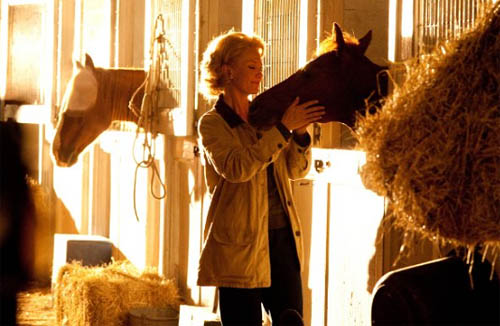Review: Secretariat

In his heyday, the racehorse Secretariat was a national celebrity. The 1973 Triple Crown winner -- the first in 25 years -- achieved fame far beyond the rarefied world of horse racing, appearing on the covers of Time, Newsweek and Sports Illustrated and gaining millions of fans. Secretariat's blazing times in the Kentucky Derby and Belmont Stakes are records that still stand today, and he's generally considered the greatest racehorse of all time.
Unfortunately, the movie Secretariat is a tepid tribute to its titular horse. For a film about the inherently exciting and unpredictable sport of horse racing, Secretariat is surprisingly dull and predictable.
According to my research, the film (opening today in wide release) is a generally accurate account of the real Secretariat's backstory. Homemaker and mother of four Penny Chenery (Diane Lane) takes over her ailing father's Virginia horse farm, Meadow Stables, thus entering the entirely masculine world of horse breeding and racing. After a complicated series of breeding agreements culminating in a fateful coin toss (consult Wikipedia if you’re really interested), Chenery ends up owning an unborn foal with a prized bloodline. Soon the colt is born and -- this being a thoroughly Disney film -- shows great promise immediately by standing up and talking his first halting steps less than a minute later.
Despite Secretariat's promise, his training and early performances are disappointing, so Chenery convinces grouchy semi-retired trainer Lucien Laurin (John Malkovich) to return to his career and turn the young stallion into a winner. As history attests, Laurin does exactly that, hiring experienced jockey Ron Turcotte (Otto Thorwarth) and pushing both horse and jockey to win most of Secretariat's early races.
Meanwhile, Chenery's increasing obsession with Secretariat causes strain at home; her husband feels neglected, and her rapidly maturing teenage daughters are finding their way into adulthood without much guidance from Mom. Chenery also must deal with her farm's seemingly insurmountable financial problems, which she could solve easily by selling her beloved horse. Of course, she keeps Secretariat -- and it would be an understatement to say this is one of her better financial decisions.
Historical sports films have an inherent problem: We already know the outcome of the Big Game or, in this case, the Big Three Races. To build dramatic tension, films like Secretariat cannot rely on the suspense of finding out who wins, so they must hold our attention with personal conflicts between interesting characters. But Secretariat mostly fails in this respect; whenever the horses aren't racing to a thundering finish, the movie is a less-than-thundering snooze.
Secretariat's snooziest aspects are the frequent discussions about finances. While Meadow Stables' money woes are often central to the story, the talky financial explanations and monetary dealings don't exactly make for gripping cinema. (They're especially boring for kids, who obviously are a large part of the Disney demographic.) As a much-needed counterpoint, a side story about Chenery's relationship with her mildly (and politely) rebellious daughters could have been a source of dramatic sparks. But the conflict never really develops beyond a few brief disagreements that end in happy Disney fashion. And Chenery's you-go-girl story of success in a male-dominated industry, another potential source of historically relevant conflict and social commentary, is barely explored beyond trading a few barbs with her male adversaries.
The pokey pacing and dramatic understatement might be tolerable if the dialogue were natural and believable. But Secretariat's script is clunky and stilted, and the dialogue is frequently preachy. Rather than merely talking to each other, the characters often speak in cheesily inspirational platitudes about overcoming adversity and pursuing dreams. (At one point, Chenery actually says, "You never know how far you can go unless you run." Yes, we know -- run, as in running horses! Yeesh.)
Speaking of preaching, there are several unexplained references to Christianity in Secretariat. Among them are horse-related Biblical quotes in the opening and closing sequences and an odd -- albeit kind of appealing -- scene in which Secretariat is bathed to a soundtrack of the Edwin Hawkins Singers' hit song from 1969, a gospel reworking of the hymn "Oh Happy Day." To be fair, these references may be intended to show that Chenery or other people in Secretariat's life were devoutly Christian people. But nothing else in the film indicates this, and my research turned up nothing to indicate it, either. The religious references don't really detract from Secretariat, but they seem out of place without any other context.
The film's simplistic script would challenge any actor, but the veteran cast members do their best under the circumstances. As Chenery, Diane Lane is all heart, albeit overly so at times. The underdeveloped story doesn't justify her emotional reactions in some scenes, but her performance is competent and far more believable than many of her groan-inducing lines. What little energy the film has comes mostly from the always entertaining Malkovich. As the French Canadian Laurin, he spouts insults in French, manages a few funny one-liners in English, and wears hilariously mixed-and-mismatched polyester nightmares straight from an early 1970s Sears catalog.
Secretariat is quintessential B-grade Disney: A predictable, sanitized film that should be much more original, artful and entertaining. If you overlook its many cinematic flaws, it's a passable primer for anyone wanting to learn about Secretariat and may be of interest to horse racing fans. But its legendary subject deserves much better.


secretariat
I understand this movie was made on a low budget. After seeing part of it,I was to bored to stay for the entirety. It was obvious that the budget was low. acting was terrible and the story was so embellished that I had to leave. Also noted few in attendance.
secretariat
Save your money. Terrible acting.
absolutely a great movie,
absolutely a great movie, well worth the money